The Mainstream Phoenix Rises: Samsung's 970 EVO (500GB & 1TB) SSDs Reviewed
by Billy Tallis on April 24, 2018 10:00 AM ESTAnandTech Storage Bench - The Destroyer
The Destroyer is an extremely long test replicating the access patterns of very IO-intensive desktop usage. A detailed breakdown can be found in this article. Like real-world usage, the drives do get the occasional break that allows for some background garbage collection and flushing caches, but those idle times are limited to 25ms so that it doesn't take all week to run the test. These AnandTech Storage Bench (ATSB) tests do not involve running the actual applications that generated the workloads, so the scores are relatively insensitive to changes in CPU performance and RAM from our new testbed, but the jump to a newer version of Windows and the newer storage drivers can have an impact.
We quantify performance on this test by reporting the drive's average data throughput, the average latency of the I/O operations, and the total energy used by the drive over the course of the test.
The Blue lines indicate the PM981, the OEM version of the 970 EVO.
The Orange lines are the 970 EVO.
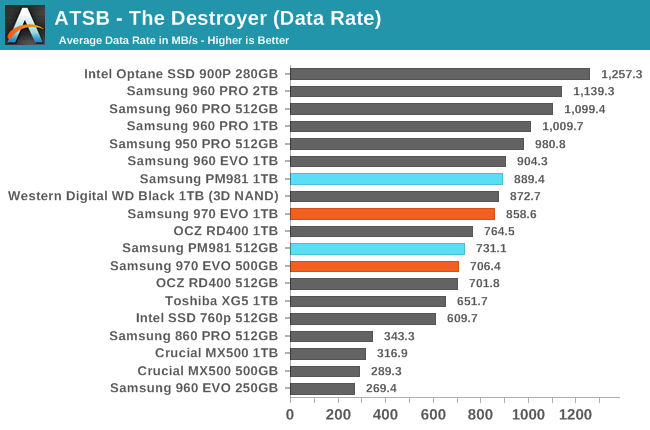
The average data rates from the Samsung 970 EVO on The Destroyer are a slight step backwards from the Samsung PM981 OEM drive and from the 960 EVO. All of the TLC-based drives are still performing below even Samsung's older MLC-based NVMe drives, and of course the Intel Optane SSD. This year's Western Digital WD Black offers about the same performance as the 970 EVO.
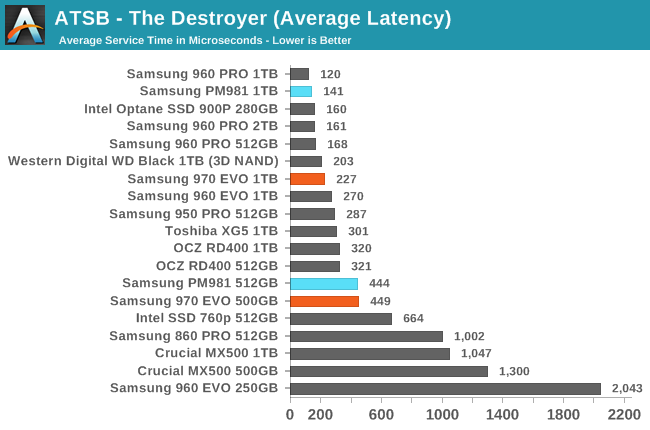
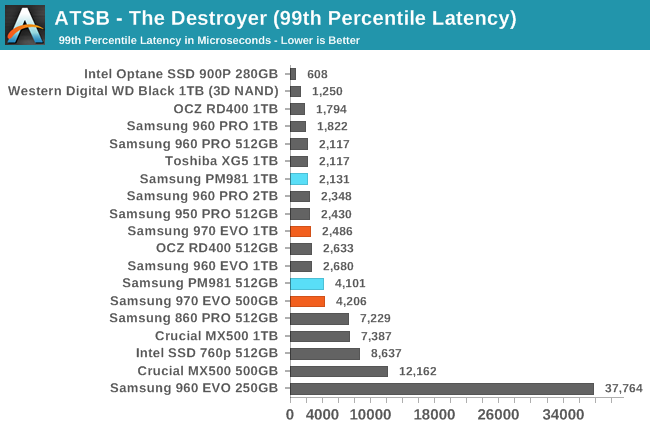
Average and 99th percentile latencies for the 970 EVO are again very slightly worse than the PM981, but on these metrics the 960 EVO doesn't beat its replacement. The WD Black has notably better 99th percentile latency than the other flash-based SSDs.
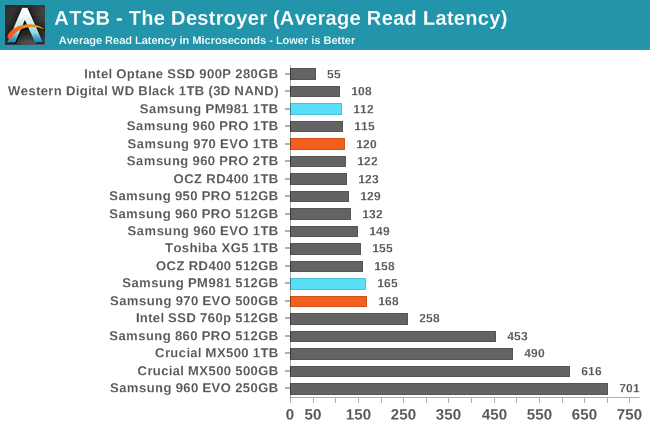
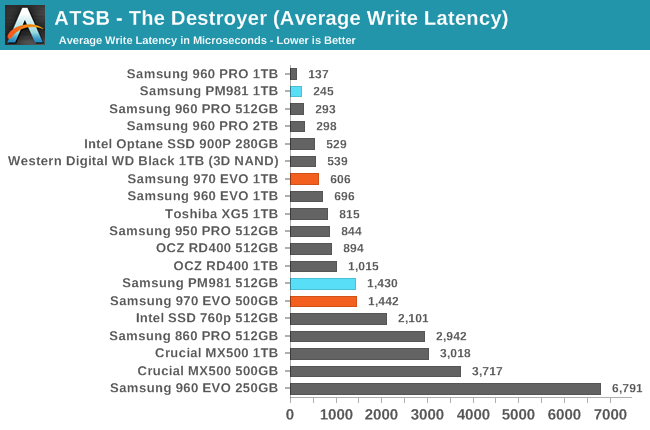
There is a clear range of average read latency scores that make up the high-end NVMe market segment. The 970 EVO doesn't stand out from the other drives in that category. For average write latency, scores vary a lot more, and the 970 EVO outperforms its predecessor slightly but fails to match the very good score the PM981 obtained.
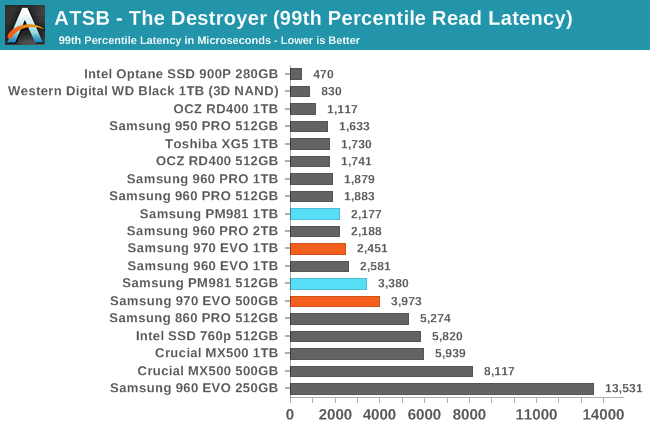
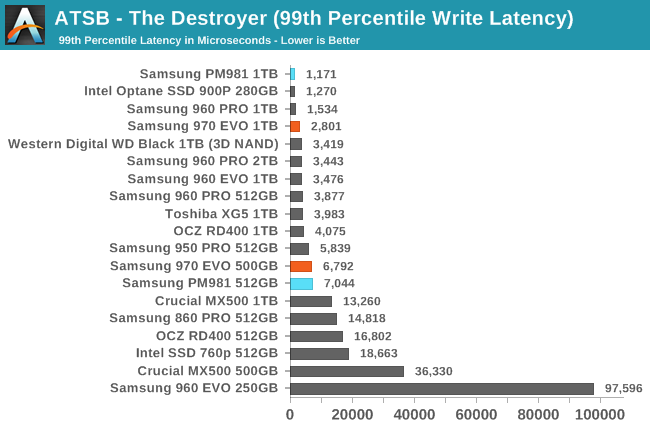
The 99th percentile read and write latency scores from the 970 EVO don't break new ground and mostly fail to match the PM981, though the differences aren't large enough to be a serious concern. The WD Black's notable QoS advantage is on the read side, where it is the only flash-based SSD to almost always keep read latency below 1ms.
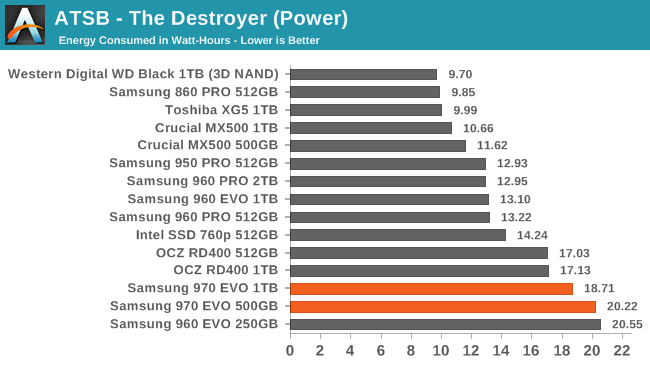
We didn't have the opportunity to measure power usage of the Samsung PM981 on The Destroyer, so this is our first look at the power draw of the Samsung Phoenix controller on this test. The situation isn't good. The 970 EVO uses twice the energy as the WD Black to does despite both drives offering about the same level of performance on The Destroyer. The power efficiency of the 970 EVO seems to be a big step backwards from the previous generation and is not at all competitive.










68 Comments
View All Comments
jjj - Wednesday, April 25, 2018 - link
The conclusion was shocking, nowadays when nobody has ethics and they just try to sell and sell and sell. What you did there is like telling people that a 500$ GPU is nuts and really, I have zero expectations for anyone to say something like that anymore. Today is all about manipulating people into being stupid and buying a politician or a product.You should make your own site, would be the only honest hardware review site on the planet. People are getting worse and worse in managing their money and parents, schools, the press are not doing anything about it.
Congrats and thanks, I've missed seeing some sanity in a review.
peevee - Monday, April 30, 2018 - link
Yep. Now if only they would start including any real-life test. Recoding a large video. Compilation of a software package. Decompressing a zip archive. I suspect they don't do it because they need to sell ads from large-margin manufacturers like Samsung.hansmuff - Wednesday, May 2, 2018 - link
If only you'd read the article properly and see what the Destroyer etc tests actually ARE.. they're explained in great detail. Follow the links. All of those things ARE IN THERE.Urbanos - Sunday, May 6, 2018 - link
Its annoying that your charts seem to have little consistency, from chart to chart one can't easily follow the comparison part for part. Older Anandtech articles never had this problem.mapesdhs - Sunday, May 6, 2018 - link
Billy, I think it would worth adding something in the article somewhere to explain why in several cases the 950 Pro still shows so strongly after all this time. I'm intrigued. I knew it could beat the 960 EVO, but even so, sometimes it's above the 970 and other unexpected newer models.Ian.
Stephan0711 - Thursday, May 10, 2018 - link
960 pro 512 TB or 970 evo 500TB for desktop use / gaming? What do you guys think?Which benchmark represents this kind of usage?
ETHANH - Friday, May 11, 2018 - link
My friend just got a 970 pro 1TB yesterday, after we tried it out. I like my HP EX920 better, similar performance, much cheaper prices.Abad - Saturday, May 19, 2018 - link
Hi Friends,My pocket allows for the 512GB only and I was waiting results from the 970 and the EX920 before I write this: Toshiba RD400 512GB is the one to go for. If you factor in: price, performance and warranty, its unbeatable. To see 2016 MLC technology competing with Q2 2018 tech and winning must ring bells. Its no rocket science. The RD400 uses the more expensive and faster MLC cells, but because it comes from 2016, it is selling same price as the cheaper and slower TLC cells used in today's SSDs. You can't have a safer bet, can you?
But then, I heard some talk that OCZ SSDs go south but even that wont deter me from going for the RD400. What do you think?